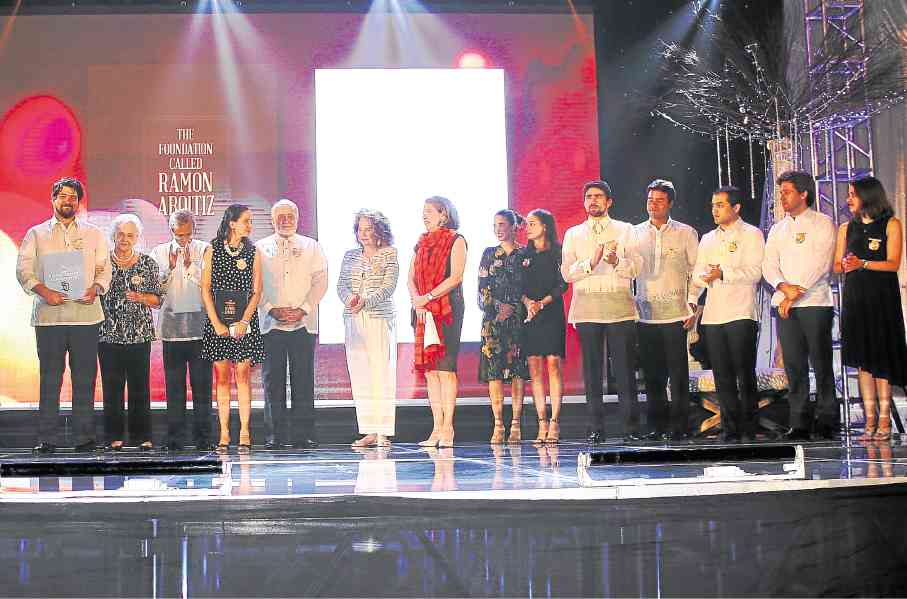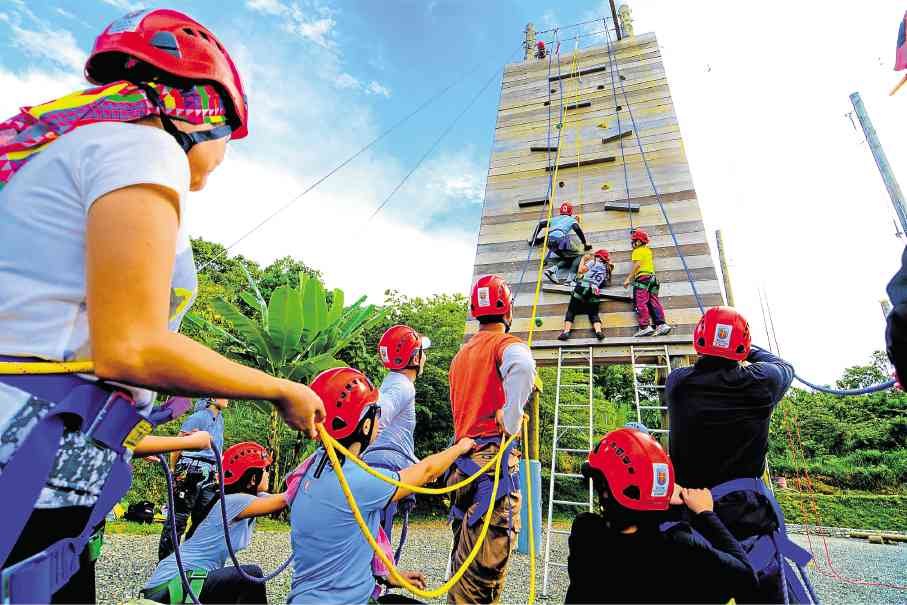
TURNOVER RITES From left: Juan Ignacio Aboitiz, Francisca M. Aboitiz, RAFI president Roberto Aboitiz, Amaya Cristina Aboitiz-Fansler, RAFI vice president Jon Ramon Aboitiz, Ma. del Rosario Aboitiz, RAFI executive committee chair Maria Cristina Aboitiz, Sofia Isabel Aboitiz, Veronique Marie Nicole Revilla-Aboitiz, Eduardo Alfred Aboitiz, Robert Quint Fansler, Juan Miguel Delgado, Carlos Ramon Aboitiz and Ana Maria Aboitiz-Delgado
With a slight quiver in her voice but with a glint of steely resolve in her eyes, Amaya Cristina Aboitiz-Fansler, the eldest among the 5th generation Aboitizes, addressed family, friends and partners in Cebu City and symbolically took over the reins of 50-year-old Ramon Aboitiz Foundation Inc. (RAFI).
Representing her siblings and cousins—great-grandchildren of RAFI founder Ramon Aboitiz— Fansler accepted copies of “The Foundation Called Ramon Aboitiz” book written by Dr. Resil Mojares and the “RAFI @ 50” coffee table book by Lorna Kalaw-Tirol.
The books were handed over by RAFI president Roberto Aboitiz, who was accompanied by his mother, Señora Francisca Aboitiz.
The handover to Fansler symbolized the passing of the responsibility of steering the family foundation over the next 50 years to the next generation.
“Fulfilling the responsibility is both a duty and a gift—to be part of a continuing legacy—one which Abuelo Ramon started, and which our grandfather, and parents have built on over the last 50 years,” she said during the celebration last Nov. 16 of the 50th anniversary of the private family foundation.
“Guided by the principles and philosophy set out by our great grandfather and inspired by the commitment and passion of our RAFI family—we take the first steps… and we look forward to journeying with all of you… To continuing the work to achieve the foundation’s vision of ‘Touching People, Shaping the Future,’” said Fansler, a member of the RAFI Board of Trustees.
Fansler pledged to continue doing the work of the foundation and to ensure “that the spirit of the founders remains alive in all of us.”
In his speech, RAFI vice president Jon Ramon Aboitiz said the two books tell the story of RAFI, how it started, the people who participated in the journey and what it took for RAFI to get to where it is today.
“Through these books, we would like to share with you how we in the family, together with the RAFI teams, work hard to keep the commitments which my grandfather, Don Ramon Aboitiz, and my father, Eduardo Aboitiz, made exactly 50 years ago to help communities, most especially those who are less privileged and in most need,” Aboitiz said.
“These books are [also] our way of ushering in the fifth generation of the Ramon Aboitiz family, who have all committed to do their part in continuing the founders’ legacy and bringing RAFI to 50 or more fruitful years,” he added.
As part of the celebration, RAFI recognized the Cebu Provincial Government and the University of San Carlos (USC) as its “Most Enduring Partners” in elevating lives.
In a statement, RAFI said its collaboration with the Cebu Provincial Government goes back to the time of Gov. Francisco Remotigue in 1966 and continued through the years, involving various programs including disaster response, school and Gabaldon rehabilitation and the Mega Cebu project.
Another important partnership project is the “Our Cebu” scorecard, which measures the performance and governance of local government units in the province.
USC, on the other hand, joined RAFI’s projects through its various departments, particularly the Cebuano Studies Center; Water Resources Center; the departments of Anthropology, Sociology, and History; and the School of Architecture, Fine Arts, and Design (formerly the Center for Architecture and Fine Arts or CAFA).


